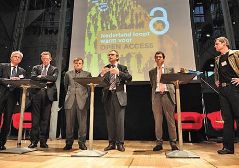New grant supports open-access publishing in the Netherlands
The Dutch higher education sector is convinced of the need for open access, writes Annemiek van der Kuil of SURFshare in a report from a recent seminar in the Netherlands

The Netherlands Organisation for Scientific Research (NWO) is investing 2.5 million euros in a special open-access (OA) budget. This money is available for researchers with an NWO grant to apply for funding to cover publication costs if submitting to an OA journal, with a maximum of 5,000 euros per research project. NWO is also reserving a further 2.5 million euros for unforeseen costs and experiments.
NWO aims to follow the so-called gold route in order to remove barriers to access to scientific and scholarly information. According to Jos Engelen, NWO’s chairman, this ideally entails publishing in OA publications directly. ‘If this is not possible we will follow the green road, i.e. by depositing preprints in repositories,’ he said. ‘If neither route is available in a discipline, we would like to develop policy to address this. This could involve encouraging the start up of OA journals in the relevant field. If the whole chain cooperates, it will work. In the end researchers should have no excuses not to publish as OA,’ he added.
In the first instance this funding will concern journal publications. ‘We are still considering research data and books, but in principle funding has also been set aside for these materials,’ said Engelen.
Engelen announced this funding at a recent seminar on OA in Amsterdam organised by SURF to mark the conclusion of SURF’s ‘Open Access Year 2009’.
Also at the seminar, various leading figures from the world of higher education unanimously expressed their support for the view that scientific and scholarly publications that have been financed by the taxpayer should be available online free of charge. They discussed how to speed progress towards achieving the OA ideal too.
Much has already been achieved in the Netherlands in OA. Dutch universities and their libraries have made more than 200,000 publications freely accessible through the NARCIS scientific portal. The Royal Netherlands Academy of Arts and Sciences (KNAW) will also include publications of the lectors who organise knowledge networks at Dutch universities of applied sciences. And the National Library is already taking care of the long-term preservation of this content.

Although all the country’s universities agree on the need to define a clear OA policy, the VU University is taking the lead by backing the NWO policy. Within 10 years the university wishes to make 90 per cent of all its published articles OA. As Rector Lex Bouter explained, ‘Research which has been partly financed with public money should also be available to the public.’
Publishers were also generally positive in the seminar discussions. Derk Haank, CEO of the Springer publishing group, went so far as to say that if scientific and scholarly publishing were to start again today, OA would be the logical route to pursue.
The Association of Universities in the Netherlands (VSNU) has just reached an agreement with Springer that in 2010 all articles in Springer journals by Dutch researchers will be made available as OA, subject to the author agreeing. Other publishers are also providing opportunities for researchers to arrange for OA when publishing their articles. Almost all publishers already allow researchers to upload the definitive author’s version of their article to their institution’s repository.
One problem for scientists and scholars is the need to publish in prestigious and expensive journals. This is important when applying for grants from organisations such as the NWO. Engelen said that the NWO would investigate ways of ensuring that OA publications would count more significantly towards the author’s ‘impact factor’. Paul Doop, a member of the board of Amsterdam University and Amsterdam University of Applied Sciences, and chair of the ICT and research platform board of the SURF foundation, argued that the problem could be solved by including a provision for mandatory OA in collective labour agreements.
Many at the seminar thought that was going too far. Engelen said, however, that his organisation was keeping close track of developments and that if insufficient progress had been made in a year’s time, the NWO would consider whether it could mandate OA, as its sister organisations in the UK and the USA have already done.
Annemiek van der Kuil is project manager of SURFshare in the Netherlands






